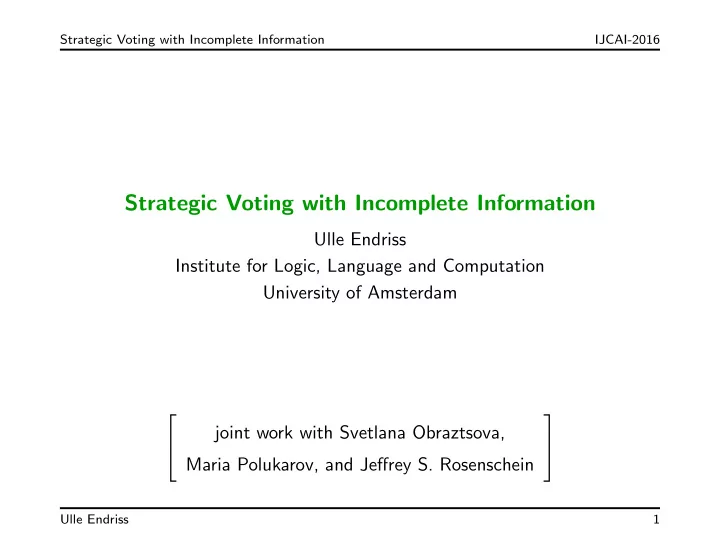

Strategic Voting with Incomplete Information IJCAI-2016 Strategic Voting with Incomplete Information Ulle Endriss Institute for Logic, Language and Computation University of Amsterdam joint work with Svetlana Obraztsova, Maria Polukarov, and Jeffrey S. Rosenschein Ulle Endriss 1
Strategic Voting with Incomplete Information IJCAI-2016 Talk Outline Much classical work in social choice theory assumes that strategic voters know exactly how everyone else will vote. Instead, we assume you only have incomplete information and we explore the consequences of this restriction: • effects on the manipulability of voting rules • effects on the convergence of iterative voting processes Ulle Endriss 2
Strategic Voting with Incomplete Information IJCAI-2016 Preliminaries Set of voters N = { 1 , . . . , n } and set of candidates C , with | C | = m . True preferences ≻ i and declared ballots b i are linear orders in L ( C ) . Resolute voting rule F : L ( C ) n → C to pick a single winner. To ensure resoluteness, we use lexicographic tie-breaking . Focus on Copeland and positional scoring rules , including in particular plurality , veto , and other k -approval rules. Ulle Endriss 3
Strategic Voting with Incomplete Information IJCAI-2016 Safe Manipulation under Uncertainty Information function π mapping profile b to “information” π ( b ) , e.g: winner information, score information, or majority graph information. Given signal π ( b ) , voter i must consider these partial profiles possible: − i ∈ L ( C ) n − 1 | π ( b i , b ′ W π ( b ) � � b ′ = − i ) = π ( b ) i She might manipulate by voting b ⋆ i instead of b i if both: − i ∈ W π ( b ) i , b ⋆ − i ) ≻ i F ( b i , b ⋆ − i ) for some b ⋆ • F ( b ⋆ i − i ∈ W π ( b ) • F ( b ⋆ i , b ′ − i ) � i F ( b i , b ′ − i ) for all b ′ i Ulle Endriss 4
Strategic Voting with Incomplete Information IJCAI-2016 Results on Manipulability The general spirit of the Gibbard-Satterthwaite Theorem prevails: essentially all reasonable voting rules are susceptible to manipulation. But we were able to identify some exceptions, such as this one: Proposition 1 Given majority graph information, the k -approval rules with k � m − 2 are immune to manipulation. Ulle Endriss 5
Strategic Voting with Incomplete Information IJCAI-2016 Iterative Voting Iterative voting with voting rule F under information function π : • initialise: all voters vote truthfully [ b 0 i := ≻ i ] • then repeat: some voter i manipulates [ b k +1 := ( b ⋆ i , b k − i ) ] Will this process converge ? • to a stable profile (nobody wants to update anymore)? • to a stable outcome (winner won’t change anymore)? Related work: for full-information case, only rules known to converge are plurality and veto (under best-response dynamics). Ulle Endriss 6
Strategic Voting with Incomplete Information IJCAI-2016 Convergence Results This would not work under full information: Theorem 2 When voters are given only winner information, iterative Copeland voting always converges to a stable outcome. For positional scoring rules we need tighter assumptions: Theorem 3 When voters are given only winner information, iterative PSR voting always converges to a stable outcome—if voters only make minimal updates (in terms of Kendall tau distance). Ulle Endriss 7
Strategic Voting with Incomplete Information IJCAI-2016 Last Slide We have seen that restricting the information a manipulator has access to in an election can sometimes have positive effects: • in terms of rendering a reasonable voting rule strategy-proof • in terms of ensuring convergence of iterative voting Ulle Endriss 8
Recommend
More recommend